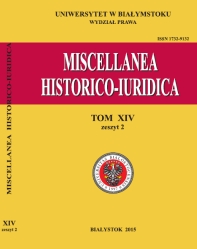Próba reformy sądownictwa powszechnego z czasów bezkrólewia po ucieczce króla Henryka Walezego (1574)
The Attempt to Reform a Common Judiciary during the Second Interregnum Following the Departure of King Henry of Valois (1574)
Author(s): Dariusz MakiłłaSubject(s): History, Law, Constitution, Jurisprudence, History of Law, 16th Century
Published by: Wydawnictwo Uniwersytetu w Białymstoku
Keywords: Interregnum of 1574–1575; the judiciary; the convocation in 1574; reform of the judiciary
Summary/Abstract: The main purpose of the paper is to present the attempt to reform a common judiciary during the second interregnum following the departure from Poland of King Henry of Valois in 1574. The paper focuses on the problem of the current functioning of the judiciary during the interregnumwhich brought with it different practical questions and a general idea of the Polish gentry to reconstruct the system of common judiciary in the Commonwealth. The essence of this idea was the exclusive taking over of the judiciary by the gentry. It meant eliminating from the courts the local dignitaries comprising the common judiciary of the clergy and burghers. The programalso provided to establish an appeal instance for all of the common courts. The project for the reform of the judiciary was presented during the convocation in 1574 and sent for acceptance to the local assemblies. However, the assemblies didn’t agree with the idea to establish a common appeal instance for the country but according to the constitutional law of the Henrician Articles (1573) and decision of the convocation made in the General Confederation Act these decided to establish the appeal instances in every district. It moved a decision for establishing the common appeal instance to the beginning of the reign of King Stefan Batory (1578).
Journal: Miscellanea Historico-Iuridica
- Issue Year: 14/2015
- Issue No: 2
- Page Range: 45-55
- Page Count: 11
- Language: Polish

